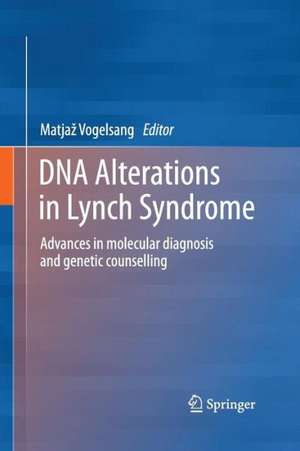DNA Alterations in Lynch Syndrome: Advances in molecular diagnosis and genetic counselling
Editat de Matjaž Vogelsangen Limba Engleză Paperback – 23 iun 2015
| Toate formatele și edițiile | Preț | Express |
|---|---|---|
| Paperback (1) | 710.96 lei 43-57 zile | |
| SPRINGER NETHERLANDS – 23 iun 2015 | 710.96 lei 43-57 zile | |
| Hardback (1) | 721.77 lei 43-57 zile | |
| SPRINGER NETHERLANDS – 25 mai 2013 | 721.77 lei 43-57 zile |
Preț: 710.96 lei
Preț vechi: 748.38 lei
-5% Nou
Puncte Express: 1066
Preț estimativ în valută:
136.04€ • 142.42$ • 112.57£
136.04€ • 142.42$ • 112.57£
Carte tipărită la comandă
Livrare economică 07-21 aprilie
Preluare comenzi: 021 569.72.76
Specificații
ISBN-13: 9789401784580
ISBN-10: 9401784582
Pagini: 208
Ilustrații: X, 195 p.
Dimensiuni: 155 x 235 x 11 mm
Greutate: 0.3 kg
Ediția:2013
Editura: SPRINGER NETHERLANDS
Colecția Springer
Locul publicării:Dordrecht, Netherlands
ISBN-10: 9401784582
Pagini: 208
Ilustrații: X, 195 p.
Dimensiuni: 155 x 235 x 11 mm
Greutate: 0.3 kg
Ediția:2013
Editura: SPRINGER NETHERLANDS
Colecția Springer
Locul publicării:Dordrecht, Netherlands
Public țintă
ResearchCuprins
Preface.- Historical Development of Lynch Syndrome.- Molecular Mechanisms and Functions of DNA Mismatch Repair.- New Insights into Lynch Syndrome Diagnosis.- Genetic Testing, an Optimal Strategy for Lynch Syndrome Identification.- Functional Analyses Help to Assess the Pathogenicity of MMR Gene Variants of Uncertain Significance.- The Role of Epimutations of the Mismatch Repair Genes in the Development of Lynch Syndrome Related Cancers.- Mutations in non-MMR Genes Modifying or Mimicking Lynch Syndrome Phenotype.- Lynch Syndrome: Genetic Counselling of at-risk Individuals and Families.- Index.
Recenzii
From the reviews:
“This highly specialized book is an extensive, multiauthored discussion of Lynch syndrome. … From health professionals implementing general health surveillance to oncologists and geneticists dealing with populations at risk of Lynch syndrome, this is a must-have book. Cancer genetics clinics should count this as part of their resources to provide accurate information to their patients. … There are no comparable publications. This book is unique in its concentration on a single disorder, and it achieves its goals with outstanding writing and planning.” (Luis F. Escobar, Doody’s Book Reviews, October, 2013)
“This highly specialized book is an extensive, multiauthored discussion of Lynch syndrome. … From health professionals implementing general health surveillance to oncologists and geneticists dealing with populations at risk of Lynch syndrome, this is a must-have book. Cancer genetics clinics should count this as part of their resources to provide accurate information to their patients. … There are no comparable publications. This book is unique in its concentration on a single disorder, and it achieves its goals with outstanding writing and planning.” (Luis F. Escobar, Doody’s Book Reviews, October, 2013)
Textul de pe ultima copertă
Lynch syndrome (LS) is the most common cause of inherited colorectal cancer, a disease with a high mortality rate. An estimated 37,000 of diagnosed colorectal cancer cases worldwide are attributed to Lynch syndrome each year. Intensive cancer screening, with early initiation and frequent follow-up, can reduce colorectal cancer incidence and mortality in LS patients. This book provides an up-to-date overview on the genetic and epigenetic basis of Lynch syndrome. It evaluates clinical features of the disease and critically comments on molecular tools available for identifying mutations responsible for Lynch syndrome; in addition the importance of functional assays that can help clarify the clinical nature of identified mutations is also discussed. The book also focuses on challenges in genetic counselling of at-risk individuals and discusses related ethical issues. The purpose of the book is to give a concise knowledge base for the broader scientific and medical community, including genetic counselors, in order to improve awareness on the potential impact that the diagnosis of LS has on treatment, management and surveillance of LS patients.
Caracteristici
Historical development of Lynch syndrome Comprehensive review on DNA mismatch repair pathway New insights into Lynch syndrome manifestation Genetic counselling of Lynch syndrome patients and related ethical issues














